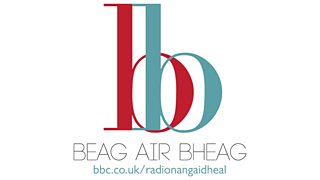Oisean a' Ghrà mair: Sreath 4: 7
1. Sùil air ais: Tha X ri dhèanamh

Rosemary Ward (‘Sàr Chlàr’)
“Às dèidh dhomh ceumnachadh bho Cholaiste Naomh Anndra mar thidsear, cha robh obraichean ri fhaighinn ann an Srath Chluaidh aig an àm.”
“After I graduated from St Andrews College as a teacher, there were no jobs to be found in Strathclyde at the time.”
FAICIBH PRÒGRAM 4.
2. DHOMH, DHUT, DHA, DHI......
dhomh dhut dha dhi dhuinn dhuibh dhaibh
‘for me / you / him / her’ ‘for us / you (pl.) / them’
(i) ÀS DÈIDH DHOMH
Rosemary Ward (‘Sàr Chlàr’):
“Às dèidh dhomh ceumnachadh bho Cholaiste Naomh Anndra mar thidsear, cha robh obraichean ri fhaighinn ann an Srath Chluaidh aig an àm.”
“After I graduated / After (me) graduating from St Andrews College as a teacher, there were no jobs to be had in Strathclyde at the time.”
às dèidh dhomh ‘after for me’
às dèidh dhomh ceumnachadh ‘after me graduating, after I graduated’
Às dèidh dhomh ceumnachadh, chaidh mi sìos a Shasainn.
‘After graduating, I went down to England.”
Às dèidh dhut ceumnachadh, thèid sinn air saor-laithean.
‘After you graduate, we’ll go on holiday.’
Seachdain às dèidh dha ceumnachadh, thòisich Calum obair ùr ann an Inbhirnis.
‘A week after graduating, Calum started a new job in Inverness.’
Às dèidh dhi ceumnachadh, smaoinichidh sinn air saor-làithean.
‘After she graduates, we’ll think about holidays.’
Às dèidh dhuinn bruidhinn ri chèile, dh’fhàs cùisean na b’ fheàrr.
‘After we’d talked, things got better.’
Às dèidh dhuibh biadh a ghabhail, faodaidh sibh falbh air chuairt.
‘After you’ve all eaten, you can go for a wander.’
Phòs iad gun ach dà mhìos às dèidh dhaibh coinneachadh.
‘They got married only two months after they’d met.’
Às dèidh do/dha Rosemary ceumnachadh, fhuair i obair ann an Lunnainn.
‘After Rosemary graduated, she got work in London.’
(ii) B’ FHEUDAR DHOMH
Rosemary Ward (‘Sàr Chlàr’):
“... cha robh obraichean ri fhaighinn ann an Srath Chluaidh aig an àm, agus b’ fheudar dhomh a dhol far an robh obair...”
‘...there were no jobs to be found in Strathclyde at the time, and I had to go where there was work...”
Feumaidh mi ‘I have to, I must’ ach
B’ fheudar dhomh ‘I had to’ (‘it was necessary for me to’)
Feumaidh tu ‘You have to, you must’
B’ fheudar dhut ‘You had to, (‘it was necessary for you to’)
Feumaidh an sgoil dùnadh. ‘The school has to close.’
B’fheudar dhan sgoil dùnadh. ‘The school had to close.’ (‘It was necessary for the school to close.)
B’ fheudar dhomh a dhol a-mach. ‘I had to go out.’
Am b’ fheudar dhut falbh? ‘Did you have to go?’
B’ fheudar dha bruidhinn. ‘He had to speak.’
B’ fheudar dhi fuireach. ‘She had to stay.’
Cha b’ fheudar dhuinn feitheamh ro fhada. ‘We didn’t have to wait too long.’
Am b’ fheudar dhuibh an taigh a reic? ‘Did you have to sell the house?’
B’ fheudar dhaibh am baile fhàgail sa bhad. ‘They had to leave town at once.’
3. ROMHAM, ROMHAD,...: Chuir mi romham
romham romhad roimhe roimhpe romhainn romhaibh romhpa
‘before me / you / him / her’ ‘before us / you (pl.) / them’
Rosemary Ward (‘Sàr Chlàr’):
“....chuir mi romham gu robh mi dol sìos a Shasainn a thòiseachadh a theagasg.”
“I decided, I made up my mind I was going down to England to start teaching.”
Chuir mi romham ‘I decided, I resolved (to do something)’ (lit. ‘I set before me’)
Chuir Rosemary roimhpe a dhol sìos a Shasainn. ‘Rosemary resolved to go down to England.’
Chuir mi romham nach robh mi dol a bhruidhinn ro fhada.
‘I decided I wouldn’t speak too long.’
An do chuir thu romhad cuin a bhios tu a’ falbh?
‘Have you decided when you’re going away?’
Chuir Pàdraig roimhe a dhol air saor-làithean leis fhèin.
‘Patrick decided to go on holiday on his own.’
Chuir Màiri-Cèit roimhpe nach dèanadh i hooveradh tuilleadh.
‘Mary-Kate decided she would never hoover again.’
Tha sinn air cur romhainn nach fhaigh sinn càr eile.
‘We’ve decided not to get another car.’
Feumaidh sibh cur romhaibh dè an ath rud a nì sibh.
‘You need to decide what’s the next thing you’ll do.’
Chuir a’ chlann romhpa gun iarradh iad peata eile.
‘The children decided they would ask for another pet.’
FAICIBH CUIDEACHD: Beag air Bheag Sreath 2, Prògram 14.

